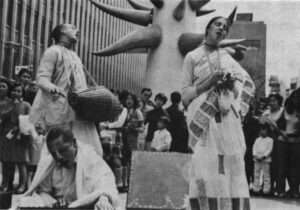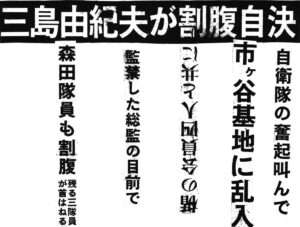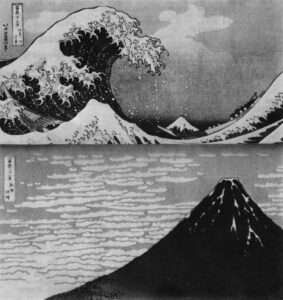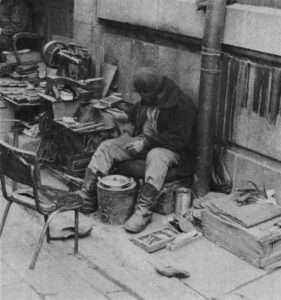He has a Japanese name, but nobody knows or cares what it is. His friends know him simply as Glue Boy. He never knew his father, an American Negro soldier long since returned to the States. His mother, a Japanese farm girl who came to Tokyo after the war and ended up selling her favors to American GIs to keep from starving to death, somehow managed to keep her ainoko (literally, love baby) with her. For nearly three years she kept Glue Boy hidden in her four-tatami mat-floored room while she worked in various bars in Shibuya, one of Tokyo’s more popular entertainment districts.
Being the mother of a love baby was a deep shame in postwar Japan, of course; but to have a half-black child in the most race conscious of nations was a double stigma. Glue Boy’s dusky skin and kinky hair were his irrefutable badges of illegitimacy. Desperate and disowned by her family, the mother dyed her little son’s curls a hideous orange-red in the hope that her countrymen would take her child at least for a half-Caucasian. But instead his henna-ed hair only underscored just how different and strange her offspring was.
Glue Boy’s introduction to the street life of Asakusa, the workingman’s suburb where his mother sought exile after her nightly stint in the Shibuya cabarets, was a violent one. Like children everywhere – but perhaps more so in Japan, where their often anthropocentric parents had taught them that ware-ware Nihonjin, we Japanese, are something akin to a race of gods – they were cruel.
More than once, stones struck Glue Boy in the face. Small, hard fists pummeled him. But the epithets hurt even worse. “Ainoko!” “Hambun–hambun” (half and half), “Kurombo-chan” (black baby). The children had a wide glossary of racial insults and they resorted to it daily.
But Glue Boy had some samurai in him, too. He fought back after a while, and he learned to hurl his own insults. By the time he had struggled his way to high school, he was the toughest kid on the block. Now, the tactics changed. His classmates simply ignored him. He had little social life. The pureblood Japanese girls avoided him like a leper, although he was, by any standard, the handsomest boy in school. By this time he had met other ainoko his age – mostly dropouts from mixed-parentage orphanages or aspiring rock musicians and singers with more frenzy than talent. But aside from their feeling of alienation and an occasional wistful longing to know who their fathers had been and what they looked like, Glue Boy and his love baby contemporaries felt little kinship.
They were strangers in what is sometimes the strangest of lands. Fatalistically, they rejected the pack instinct and went their own lonely ways. Bitter and disenchanted, Glue Boy quit school and ran away from his mother.
Then one afternoon at the Fugetsu-do (Wind and Moon) coffee shop near Shinjuku station in Tokyo, Glue Boy met some Japanese hippies. These futen wore American cowboy jeans and long hair and, best of all from Glue Boy’s point of view; they had rejected all ties with family, the Establishment and with what is often called the Japanese Way. They had no basic ideology or politics; only the vague conviction that society – particularly a frenetic, technocracy like their own country – was sick. They were steppen-wolves. And Glue Boy – the nickname he was soon to acquire and accept as an appellation of honor – had at last found his own kind…
11 A.M. – Glue Boy stood near the east entrance of Shinjuku station. His hair was wild and electrically frizzled in the en vogue Dylanesque fashion. He wore bleached jeans, zori thongs and a Levi jacket with a peace symbol painted on the back.
Two American soldiers, in Tokyo on R & R leave from Vietnam, (the west entrance to the station is the gathering place for the Beheiren – Peace for Vietnam Federation – pacifists, who often smuggle defecting American GIs to third-country sanctuaries such as Sweden) approached.
“Hey, brother,” Glue Boy said in his cools very understandable English. “Got any extra change? I’m a Japanese hippie, man.”
The soldiers, both of whom happened to be blacks smiled and looked at him incredulously. Maybe they sensed the ethnic brotherhood. Each handed him a thousand-yen note.
It was a major coup. Now Glue Boy had about $5.75 – more than enough to see him through another day on nearly twice his average stipend. Usually he wasn’t so lucky in his efforts to solicit “campa” (contributions) from passersby.
“Women are the biggest suckers, man,” he said. “Especially young girls traveling in couples. You know, one fat one and one pretty one. When one of them gives me campa, the other wants to give more so she won’t look like a cheapskate.”
Glue Boy smiled euphorically. His commissariat problems for the day were solved. He had cash for four or five cups of coffee at the Fugetsu-do, a dish of curry and rice, some rahmen Chinese noodles as a late snack with soft ice cream and a Fanta grape soda for dessert. And there would be enough left over for a sack of buns and a couple of packets of Hi-Lites, his favorite cigarettes.
Plus, of courses his daily “fix” of ten bottles of airplane glue.
3 P.M. – Glue Boy and three of his hippie friends sat around a tiny circular table on the second-floor loft of the Fugetsu-do. A Wes Montgomery record was playing on the stereo, the guitar ran subtle and sure. Downstairs on the main floor students pored over textbooks or talked in low, laid-back voices. The atmosphere was a sort of anachronistic Camus Cool, with everybody seemingly trying to be hipper meaning more detached and existential – than everybody else.
The conversation turned to drugs, Glue Boy, who learned his basic English from his mother’s myriad boyfriends and, later, In the R & R clip joints where he sometimes works as a dishwasher and handyman, was the spokesman.
“We dig airplane glue, or paint thinner if we can’t score that,” he said. “We like the high we get. You know, the hallucinations seem to groove with the feeling of being alone, of being cut off from everything, from everybody. Yes, I read that more than 100 of us have been killed by the thinner fumes, but I don’t believe. It is just government lies.
“They also say it is bad for our health. I must agree.”
(Note: Japanese government medical examiners, who made a study of the glue and thinner addicts, say the sniffers suffer from a whole gamut of maladies ranging from liver trouble, anemia, ague, adrenal gland malfunction and swollen kidneys to frequent headaches, amnesia and bad complexion.)
How about marijuana and LSD?
“Too dangerous,” Glue Boy replied. His friends nodded emphatic agreement. “Japanese plainclothes cops everywhere. Often they come in here. Especially they look for gaijin (foreigners) who bring the stuff in from Vietnam and Cambodia. Oh, there’s plenty of it around, but why take the chance. We like the fun of the glue and thinner play better.”
A bearded expatriate American at the next table overheard our conversation.
“Your friend is right about grass being too tight here,” he said. “The Japanese cops busted this American dude I know and held him for three weeks in prison – I mean, it was an absolute dungeon – simply because his Japanese girlfriend had told the police he gave her one joint. No evidence, mind you; just the chick’s word. Their reasoning? Well, if there was any it was that she was Japanese and he was a foreigner. Of course, foreigners are much more given to lying than the Japanese are, right?
“When the cat got out of jail, he was forced to admit that prison was the only place he had been In Tokyo where everybody was treated equal, gaijin and Japanese alike. Meaning that everybody was treated like dogs…”
Glue Boy and his “family” were growing restless. It would soon be time to meet their connection. Moving listlessly, the futen gang followed their leader out of the coffee shop and into the blaring traffic of Shinjuku. Glue Boy, the love baby with the orange hair, had come of age…
6 P.M. – For more than two hours now, Glue Boy and his gang plus perhaps a dozen more wandering futen have been waiting for Uncle Thinner. But Uncle Thinner, who is a glue pusher of wide reputation with Shinjuku’s hippies as well as with the police, is late. The sniffers are growing restive.
Glue Boy dances around, shadowboxing. He makes a swift run along a battery of red public pay phones, reaching into each coin return slot in search of a random ten-yen coin.
No, we are not like the Zengakuren or the Sokagakkai or any of those,” he says. “We don’t believe in politics or religion. The Zengakuren and the Sokagakkai are today’s rebels only. Soon they will be worrying about getting out of college and into a salaryman position with one of the big zaibatsu firms. We futen are few in number – only a couple hundred. We do our own things man, not like any other group in Japan. We may be weak in body, some of us, but we are not weak in mind.”
(Note: Last fall, after a battalion of futen set fire to the east entrance of Shinjuku station, the Tokyo Juvenile Classification Office conducted an intensive survey of the resident long-hairs. The composite futen emerged as a resident of Tokyo, the product of a middle-class home with a middle school education or less and an I.Q. of around 89, the bottom of the “ordinary” intelligence scale.)
7 P.M. – “Uncle Thinn-ah!” somebody shouted. With a rush the futen converged on a small, balding man in a rumpled business suit. He could have been anywhere between 40 and 60 years old. He looked like a pimp, at once jolly and predatory.
Glue Boy made his “score” quickly, with no wasted words. He handed Uncle Thinner one of his “campa-ed” thousand-yen bills and the pusher – whose business is booming because the model shops refuse to sell glue to the futen –gave him ten bottles of liquid adhesive and a handful of polyethylene bags. Uncle Thinner flashes his brass-capped teeth. He bought the glue for only 50 yen a vial, and he is pleased at the profit margin.
The futen wander away, seeking murkier corners of the station. Soon the “adhesive play” begins in earnest. A young futen girl of perhaps 18 is the first to get really high; it takes only two or three tentative whiffs from the plastic bag. She sobs hysterically, but the passersby pay scant attention to her. “I try to be a good daughter to my parents,” she says between sobs, “but I can’t.”
Another couple stand locked in a passionate embrace. Public displays of affection, even under the influence of the “balloon,” are rare in Japan. A gaggle of semi-drunken Japanese men stop to stare. The sight seems to sober them up; after a few minutes they simply shake their heads and toddle off to catch the next train home to wife, a hot cup of tea and the late show on the new color television.
It is very much like a bad group acid trip. Two futen writhe on the dank cement floor of the station. Others real around giddily, dancing to some silent, cosmically-choreographed symphony of despair and frustration.
Glue Boy’s shadowboxing has become a vicious pantomime. He has put on a pair of black leather gloves and is punching some imaginary face – probably a black face – to a bloody pulp. The symbolism, and the lucidity of his personal nightmares is obvious.
Our eyes meet. The bond has dissipated. My face is not black, but it is the face of the country that brought this agony upon him. Then, at that instant, we both flash that this is the ultimate irony: An ainoko, a love child, who has found his fleeting Nirvana in a bag of glue, but cannot express the one emotion that will save him – love.
MIDNIGHT – As if on clue, the police appeared. They advanced half-heartedly. Apparently they were willing to give the “balloon children” a chance to escape if they chose to.
“The Mappo,” Glue Boy said, stuffing his whiff-bag under his shirt. His group seemed to revive quickly from their euphoria. The futen band slouched toward the exit, moving slowly enough to salvage their cool, yet keeping a safe distance from the police.
Glue Boy didn’t wave goodbye, but headed toward a nearby park where he would spend the night sleeping in the open – and perhaps dreaming of the father he never saw.
Received in New York on June 9, 1970.
©1970 Darrell Houston
Darrell Houston is an Alicia Patterson Fund award winner, on leave from the Seattle Post-Intelligencer. This article may be published, with credit to Darrell Houston, the Post-Intelligencer and the Alicia Patterson Fund.




